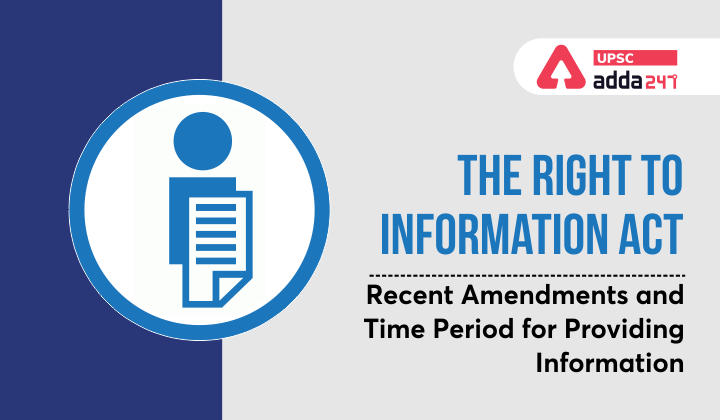Table of Contents
The Right to Information Act- Relevance for UPSC Exam
- GS Paper 2: Important aspects of governance- Citizens charters, transparency & accountability and institutional and other measures.
The Right to Information Act
- The Right to Information Act is revolutionary legislation that aims to promote transparency in government institutions in India.
- The Right to Information Act came into existence in 2005, after sustained efforts of anti-corruption activists.
- We have already discussed the key concepts of the Right to Information Act, historical background and its objectives, Key Provisions of the RTI Act, and the Applicability of the RTI Act.
- In this article, we will discuss Recent Amendments to the RTI Act and the time period within which a public authority shall provide information to the information seeker citizen.
The Right to Information Act- Time Period for Providing information
- In Normal Situations: information is to be provided to an applicant within 30 days from the receipt of the application by the public authority.
- In Life-Threatening Situations: Information shall be supplied within 48 hours by the concerned public authority.
- In case the application is sent through the Assistant Public Information Officer or it is sent to a wrong public authority, five days shall be added to the period of thirty days or 48 hours, as the case may be.
Fill this form to get free Study Material of UPSC ESIC Deputy Director
The Right to Information Act- Recent Amendments
- The Right to Information (Amendment) Bill 2013: It removes political parties from the ambit of the definition of public authorities and hence from the purview of the RTI Act.
- Draft Provision of 2017: it provides for closure of case in case of death of applicant can lead to more attacks on the lives of whistleblowers.
- The Right to Information (Amendment) Act 2019: It seeks to give the central government the power to fix the tenures and salaries of state and central information commissioners, which are statutorily protected under the RTI Act.
- It proposes to replace the fixed 5-year tenure with as much prescribed by the government.
- The move will dilute the autonomy and independence of CIC.




 TSPSC Group 1 Question Paper 2024, Downl...
TSPSC Group 1 Question Paper 2024, Downl...
 TSPSC Group 1 Answer key 2024 Out, Downl...
TSPSC Group 1 Answer key 2024 Out, Downl...
 UPSC Prelims 2024 Question Paper, Downlo...
UPSC Prelims 2024 Question Paper, Downlo...




